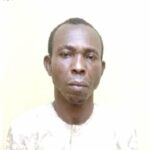
Mrs Juliana Ojelade, a retired civil servant, who recently turned 80, speaks to DAUD OLATUNJI about her life experiences
How do you feel turning 80 years old?
I am very happy, even though my family couldn’t celebrate it much, due to this time we are in. My children wanted to throw a party for me, but I insisted that they shouldn’t do it. I told them I preferred that they provided pipe-borne water for the community where I grew up in memory of my late parents and they did it for me.
Can you tell us more about your background and childhood?
I was born and raised in Olofin. It is situated in the Odeda Local Government Area of Ogun State. My childhood was a bit rough. I was born and raised in the village, and there was no help from anywhere, but with the grace of God, I am where I am today.
My father, Solomon Shodiya, and my mother, Felicia Shodiya, were both farmers. My father was strict and did not like spending money on his children. I might have not been allowed to go to school if not for the intervention of his friend. My father did not want to enroll me in school, but after much pressure, I was enrolled. His friend was one of the leaders in the Anglican Church, Orile-Ilugun. It was that man that insisted that I must be enrolled. Then, I was above the age limit. I was 13 years old then. My uncle had advised my father not to allow me to go to school because they had the belief that a girl child would not be useful to her family but to her husband. That was why I told my children to provide pipe-borne water for my village to show that girls are useful.
My mother died when I was 20 years old. My father died when I was close to 30. During my childhood, everything was quite hard. My father was harsh, though he was rich. He did not joke with his money. When I was a pupil, our village was quite far from the school but I was very interested in getting an education and God blessed me with a good brain because while I was at Olofin, I was among the best three pupils.
During market days, I carried goods on my head to the market square before heading for school. I attended primary school in Olofin. The primary school in Olofin did not exceed Primary Four then, so, if one wished to study further, one had to attend Orile-Ilugun. So, it was at Orile-Ilugun Primary School that I finished Primary Six and completed Modern Three.
What did you do afterwards?
I started looking for menial jobs after my education, but in 1972, I got a job at Daily Print in the Ministry of Works in Abeokuta as a typist. That was when things started becoming easy.
Where did you learn typing?
I learnt how to type at Oke-Itoku after my primary school education.
Why did you learn typing?
I learnt how to type when there was nothing to do and suffering was too much for me. There was no money at that time I could use to establish a business. So, I had to go to Oke-Itoku to learn how to type and God eventually did it.
How did you get the job at the ministry?
There was a lady with whom I learnt typing. She was the one that took me to the Ministry of Works. I could speak English, so I got a job there as a casual worker. And you know that as a casual worker, one could be dismissed at any time and anyhow. A friend of mine took me to Ibadan to see her boss about whether I could be offered a job and on getting there, we were told that there was no vacancy in the Ministry of Works, Eleyele, in Ibadan. After much persuasion, her boss, who was a Permanent Secretary, contacted his colleague in different ministries and I later got employment in the Ministry of Establishments. I was paid 16 kobo initially but later received 48 kobo in the second month. My husband got employed at First Bank in Lagos.
Did you and your husband live separately?
Yes. But later, an in-law who was the principal accountant at the Federal Ministry of Finance said he didn’t want me and my husband to be in separate places. So, one day, he asked me to come. He told me to report to the Federal Inland Revenue Service in Lagos from Ibadan where I was working. I did not report to the FIRS in Lagos immediately. I was employed after I passed an examination. At the time, I wasn’t interested in the job because the responsibility was too much. My children had already gained admission into the university, so I did menial jobs and got contracts during the administration of ( a former governor of Lagos State, the late Lateef) Jakande and I also had a business at Mile 2.
How did you meet your husband?
When I was in Primary Two, my husband was transferred to our village. He was a teacher then, but we were not dating because I was too young. He left our village to do a course. After that, he met one of my brothers in Abeokuta and asked about me. My brother told him that I was in Abeokuta. There was a particular day we saw each other at Ake and that was how we started. We waited till I finished Modern 3 (before getting married). I was 23 years old when we later saw each other and got married.
How old was your husband then?
He was 29 years old when we got married and I was 23 years old then.
Had you also always liked him back when he was your teacher?
What attracted me to him was the fact that he was educated and was still young and my father liked him then. He was friendly in those days but he is now hostile towards me and I think that it is because of old age.
What was your wedding day like?
My father asked for kola nuts and a bottle of gin and he prayed for us.
Teachers back then were quite respected. Did you consider yourself lucky marrying one?
It was quite beneficial, particularly as regards the education of our children. My husband always helped our children with their schoolwork and made sure they finished their homework before he returned from work. I am happy that I got married to a teacher.
What is your view on virginity?
It is quite hard for female children because nowadays because there are a lot of immoral activities going on. Did you know that during my days, some males used to use charms on girls to break their virginity? Back then, if a lady got married and her husband didn’t meet her as a virgin, people tagged her as an indecent girl.
As someone who grew up in the village, how do you compare that to the life in the city?
Life in the city is better because working hard doesn’t make one rich in the village. Some of the people in the village have money but don’t spend it to get good life. I remember that as a child, I used to fetch water to drink from a river where the villagers also washed and bathed. The water didn’t kill us then, rather, it made us stronger. Rural communities need proper monitoring. They just have councillors who only visit the villagers when elections are around the corner. The government does not take care of the people.
What was security like back then in the villages?
The security was good in those days. There was nothing to be afraid of. I told you that where I went to school was far from my home. I used to leave my home at about 5am or 6am and I trekked back home in the evening around 7pm and did not get home till about 9.30pm or 10pm. People cannot move around late nowadays.
Were crimes like rape and cultism, rampant at that time?
There was nothing like rape and cultism in those days. The issue of sex-for-marks was common then. I remember that a particular year, there was a teacher I suspected because of the way he behaved towards me. I told my father’s friend about it when I got home and the teacher was summoned by the community. During that period, some teachers were notorious and got female pupils pregnant. But any teacher caught in the act was sacked.
Can you share your happiest and saddest moments?
The first was when my first and second children gained admission into the university. I was still with the FIRS then. I was very happy. A man who was also a teacher in the same school as my husband helped us with the admission letters. I was very happy the day we collected the letters. I had to take a loan from a bank, which I gave to my daughter to enable her to leave for school. The second happiest moment was the day my first child travelled to the United States of America. I was surprised that such a thing could happen in my life. The third was when I travelled to the USA, Canada and Jerusalem. Life in those countries is very different. They fare better over there than us here. Things work well there, but here, it is different.
You mentioned earlier that your dad was strict. What is your parenting style?
I am a bit strict because my dad was strict. God helped me to raise my children. There was one of my friends then, who is now deceased, her child was badly behaved.
What was your biggest challenge as a parent?
My biggest problem as a parent was not having enough money to spend on my kids when they did well in school. But I had good friends who helped me a lot. One of my friends that we called Iya Lola gave me N50,000 in 1999 for my son’s trip to the USA. She loaned me the money.
What do you consider some of the best virtues you have instilled in your children?
I imparted the fear of God in them and I also taught them to be content with what they have. I have five children and all of them are university graduates and they have master’s degrees also.
They must have emulated me because I don’t joke with prayers. In Lagos, I attended a fellowship and was appointed as the leader of women. I told them I didn’t have the means to serve in that capacity but I accepted it partially.
How did you manage to strike a balance between family and church activities?
They didn’t clash because God gave me grace. I always contribute to the church even if it is little.
Do you preach?
I don’t address the congregation or preach. I just go and worship and listen to the word of God. I don’t like being noticed whenever I do something in the church. I like to operate behind the scene.
Do you have any regrets?
No, I don’t have any regrets at all.
What is your biggest motivation and inspiration?
I don’t like being stagnant in a position and I love doing things that fetch me money until old age catches up on me.
What are you most grateful to God for?
I am grateful to God for blessing me with my children.
How have you managed to stay healthy and radiant at 80?
God has been helping me to manage my health and my children are also taking a good care of me.





